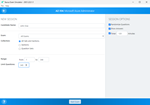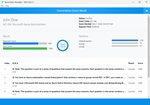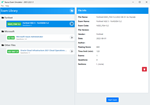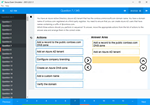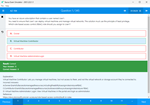Download MuleSoft Certified Platform Architect - Level 1.MuleSoft-Certified-Platform-Architect-Level-1.SelftestTraining.2019-12-10.34q.tqb
| Vendor: | Mulesoft |
| Exam Code: | MuleSoft-Certified-Platform-Architect-Level-1 |
| Exam Name: | MuleSoft Certified Platform Architect - Level 1 |
| Date: | Dec 10, 2019 |
| File Size: | 2 MB |
How to open TQB files?
Files with TQB (Taurus Question Bank) extension can be opened by Taurus Exam Studio.
Purchase
Coupon: TAURUSSIM_20OFF
Discount: 20%
Demo Questions
Question 1
What API policy would LEAST likely be applied to a Process API?
- Custom circuit breaker
- Client ID enforcement
- Rate limiting
- JSON threat protection
Correct answer: A
Explanation:
Reference: https://docs.mulesoft.com/api-manager/2.x/policy-mule3-provided-policies Reference: https://docs.mulesoft.com/api-manager/2.x/policy-mule3-provided-policies
Question 2
An organization is implementing a Quote of the Day API that caches today's quote.
What scenario can use the CloudHub Object Store via the Object Store connector to persist the cache's state?
- When there are three CloudHub deployments of the API implementation to three separate CloudHub regions that must share the cache state.
- When there are two CloudHub deployments of the API implementation by two Anypoint Platform business groups to the same CloudHub region that must share the cache state.
- When there is one deployment of the API implementation to CloudHub and another deployment to a customer-hosted Mule runtime that must share the cache state.
- When there is one CloudHub deployment of the API implementation to three CloudHub workers that must share the cache state.
Correct answer: C
Question 3
What condition requires using a CloudHub Dedicated Load Balancer?
- When cross-region load balancing is required between separate deployments of the same Mule application
- When custom DNS names are required for API implementations deployed to customer-hosted Mule runtimes
- When API invocations across multiple CloudHub workers must be load balanced
- When server-side load-balanced TLS mutual authentication is required between API implementations and API clients
Correct answer: B
Question 4
What do the API invocation metrics provided by Anypoint Platform provide?
- ROI metrics from APIs that can be directly shared with business users
- Measurements of the effectiveness of the application network based on the level of reuse
- Data on past API invocations to help identify anomalies and usage patterns across various APIs
- Proactive identification of likely future policy violations that exceed a given threat threshold
Correct answer: B
Explanation:
Reference: https://usermanual.wiki/Document/APAAppNetstudentManual02may2018.991784750.pdf Reference: https://usermanual.wiki/Document/APAAppNetstudentManual02may2018.991784750.pdf
Question 5
An API implementation is deployed on a single worker on CloudHub and invoked by external API clients (outside of CloudHub).
How can an alert be set up that is guaranteed to trigger AS SOON AS that API implementation stops responding to API invocations?
- Implement a heartbeat/health check within the API and invoke it from outside the Anypoint Platform and alert when the heartbeat does not respond.
- Configure a “worker not responding” alert in Anypoint Runtime Manager.
- Handle API invocation exceptions within the calling API client and raise an alert from that API client when the API is unavailable.
- Create an alert for when the API receives no requests within a specified time period.
Correct answer: D
HOW TO OPEN VCE FILES
Use VCE Exam Simulator to open VCE files
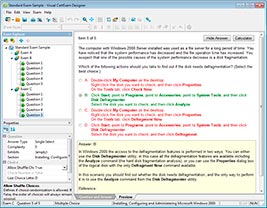
HOW TO OPEN VCEX FILES
Use ProfExam Simulator to open VCEX files


ProfExam at a 20% markdown
You have the opportunity to purchase ProfExam at a 20% reduced price
Get Now!